Great Embassy of Peter I in Germany and Holland
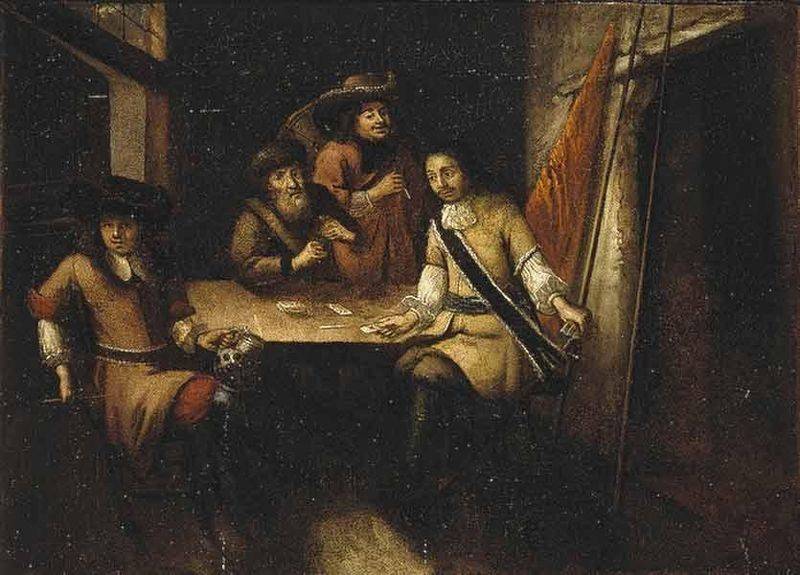
At the end of the XNUMXth century, Russia needed allies in the war with powerful Turkey. But will European countries want to fight the Turks? And how can Russia fight the Turks if it has a catastrophic shortage of officers, both land and sea?
And where does Peter get generals and admirals? Hiring them in Europe was practiced, but, as subsequent events showed, it was their own commanders who were more reliable. Craftsmen were also needed to build ships. To this end, Peter sends 50 young nobles to Europe to study military and naval affairs. This, like many other transformations of Peter, caused the strongest murmur in society.
Even, it would seem, a useful thing - digging a canal between two rivers - also caused strong grumbling and indignation. Most Russians considered this not a charitable deed, because, as they thought, it is impossible to turn the streams in the other direction, when God has already turned them to the right place. Sending nobles abroad is all the more not a charitable thing, they said, because they go to heretics!
Peter had almost no supporters of the transformations, so everything was carried out only thanks to the iron will of the king. Peter knew perfectly well that 100 years before him, Boris Godunov had already made attempts to send nobles abroad for training, but most of those nobles remained abroad, not wanting to go back. Therefore, Peter assigned a soldier to every person traveling to Europe.
The goals of the embassy
In December 1696, Peter decided to go abroad himself.
For the tsar to leave the borders of Russia - this has never happened before. Not only kings, but also ordinary subjects did not travel abroad. If one of the Russian nobles in the pre-Petrine era arbitrarily traveled to another country, then he was considered a traitor to the Motherland, and if he returned, he was threatened with execution. For example, during the reign of Peter's grandfather, Mikhail Fedorovich, Prince Khvorostinin was subjected to severe persecution only because, in the presence of friends, he started talking about traveling to Poland and Rome.
Despite this, Peter did not refuse to travel to Europe, but nevertheless decided to go not under his own name, but under the name of a simple officer Pyotr Mikhailov. An embassy is being equipped, which will later be called great. The purpose of this embassy was to visit in turn the emperor of Austria, the king of England and Denmark, the pope, Holland - all of Europe, excluding France and Spain -
That is, the purpose of the embassy was to draw European countries into a war with Turkey. There were only three envoys: Lefort, who was considered the first envoy, as well as Golovin and Voznitsyn.
All members of the embassy were strictly forbidden to say that the tsar was traveling with them. All letters that were addressed to the sovereign from Russia should have only had the inscription: "hand over to Pyotr Mikhailov." Peter himself then signed his letters: “scorer Piter”.
But for Russian society, as later for European society, it was no secret that the Russian tsar was going to Europe. Most Russians thought that the tsar was only traveling for entertainment.
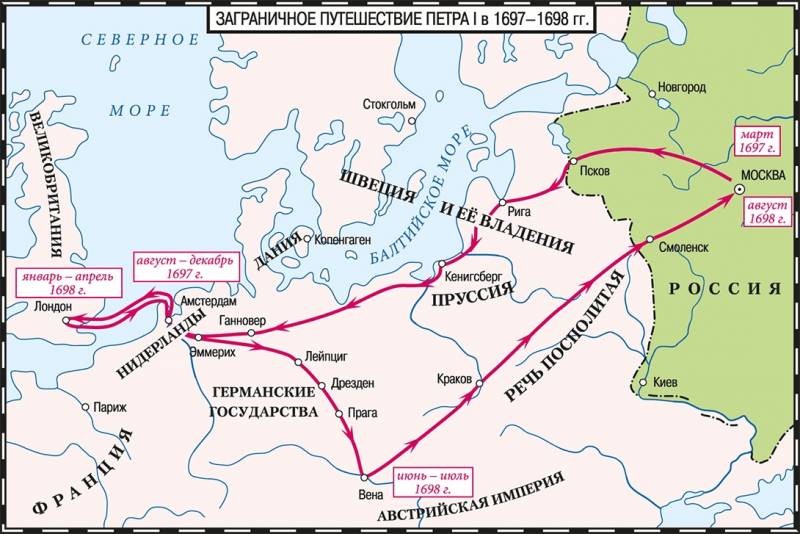
The situation in Russia on the eve of departure
At the beginning of 1697, Peter was handed a message, the author of which was the monk of the Andreevsky Monastery Abraham. In this message, the monk reproached the tsar for his behavior, which was considered unworthy of the tsar, for his passion for "indecent fun", he called shipbuilding fun, and also reproached Peter for all his undertakings, which, according to Avraamy, absolutely do not need Russia.
At the end of the message, the monk did a great stupidity: he signed the letter with his name and asked for a meeting with the king. The meeting took place, but not in the palace, but in the dungeons of the Preobrazhensky Prikaz. Under torture, the monk confessed that many dissatisfied with the actions of Peter gathered in his cell. Some of them were arrested, but since they did not intend to kill or overthrow Peter, they got off with light punishments.
In February, a more serious plot was uncovered, the purpose of which was to kill Peter. The leader of the conspiracy was the Streltsy Colonel Ivan Tsikler. In 1682, he took an active part in the Streltsy uprising on the side of Sophia and the Miloslavskys. But in 1689 he betrayed Sophia and went over to the side of Peter. He hoped to kill Peter with the help of archers, who also hated him.
Many nobles also joined the conspiracy, in particular Alexei Sokovnin and Fyodor Pushkin, the ancestor of the famous poet.
After the disclosure of the conspiracy, Peter himself interrogated its participants, who were tortured. The leaders of the conspiracy were sentenced to death, which was soon carried out.
Departure of the embassy
It would seem that after two conspiracies, Peter had to abandon the trip, but the preparations for the embassy continued. Peter left Prince Romodanovsky as ruler instead of himself in Moscow. Contemporaries said about him:
But, despite this characterization, no one could accuse Romodanovsky of embezzlement or bribery. He was an honest and disinterested man, albeit a cruel one.
Finally, the preparation of the embassy was completed, and on March 10, 1697, it left Moscow. The embassy consisted of 250 people, among whom were 30 volunteers intended to study maritime affairs and shipbuilding in Europe.
The first foreign city where the embassy stopped was Swedish Riga. In this city, many knew that the tsar himself was present at the embassy, but the governor of Riga, Dalberg, pretended to know nothing about this. When Peter wanted to inspect the fortifications of the city through a telescope and put them on paper, this was strictly forbidden to him. Dahlberg remarked to Lefort that the people of his retinue allow themselves such liberties. In Riga, they well remembered that Peter's father, Alexei Mikhailovich, besieged the city, his son could repeat the same thing in the future (and eventually did it again). Peter harbored a grudge against the Swedes, and the embassy immediately left the city.
The next city visited by the Russian embassy was Mitava, the capital of the Duchy of Courland. The Duke gave the Russians a more hospitable welcome than in Riga.
In early May, the embassy arrived in Königsberg, where he was met by the Elector of Brandenburg Frederick, the future first king of Prussia. The reception was solemn. In Königsberg, Peter stayed with the embassy for more than a month, until June 10. All this time, the tsar closely followed the events in Poland.
In Poland, after the death of Jan III Sobieski, the election of a new king took place. The state structure of this country was a mixture of a monarchy and a republic, and the Commonwealth took the worst from each of them. In fact, it was ruled by a king, elected by the Sejm for life. But he could not make a single important decision if at least one person in the Sejm was against it.
There were two contenders for the empty Polish throne: the French protege Prince de Condé and the protege of Russia, Elector Friedrich August.
In early July, when Peter had already left Königsberg, he received the good news about the election of Frederick Augustus as the Polish king, who ruled under the name of Augustus II. His election as king of Poland is the most important event in stories Russia's relations with the Commonwealth, since, starting from his election as king, Russia will more and more, until the fall of the Commonwealth, will interfere in its internal and external affairs.
Augustus was elected king of Poland mainly because the Russian resident in Warsaw, Nikitin, threatened the Poles that if they elected Prince de Condé, Russia would put itself in hostile relations with Poland, that is, threatened with war.
But back to Peter. Leaving Koenigsberg, he went to Holland. In Berlin, the future capital of Prussia, Peter did not stop without considering it necessary. But he made a stop in the small town of Konnenburg, where he was met by the Elector of Hanover Sophia and her daughter, Sophia Charlotte, Elector of Brandenburg. Peter, having learned that many courtiers had gathered in the palace, did not immediately decide to go out to them. Then a solemn dinner took place in the palace. At the table, Peter, according to Russian custom, forced all the courtiers to drink wine by glasses.
Peter's meeting with the Electors in Connenburg lasted only a few hours, but they managed to form an idea of their new acquaintance. Sofia later wrote:
In another letter, the Elector noted:
Everyone also drew attention to the convulsions that changed the face of the tsar, as well as to his inability to eat neatly and use napkins, which were then unknown in Russia. The general opinion of the electors about Peter was this:
Holland
Then Peter went to Holland. Both in Germany and in Holland, the presence of Peter in the embassy was not a secret to anyone; Peter himself did not sacredly keep a secret.
On August 7, Peter with six volunteers, including Alexander Menshikov, arrived in the Dutch town of Saardam before the embassy. There he met the blacksmith Gerrit Kist, whom he knew back in Moscow, and stayed at his house. This house later became a museum. Peter himself slept in the closet there, as it was then fashionable in Holland. Paul I, Alexander I, Alexander II will later visit this house. Napoleon, who also visited this house, said about Peter's small locker:
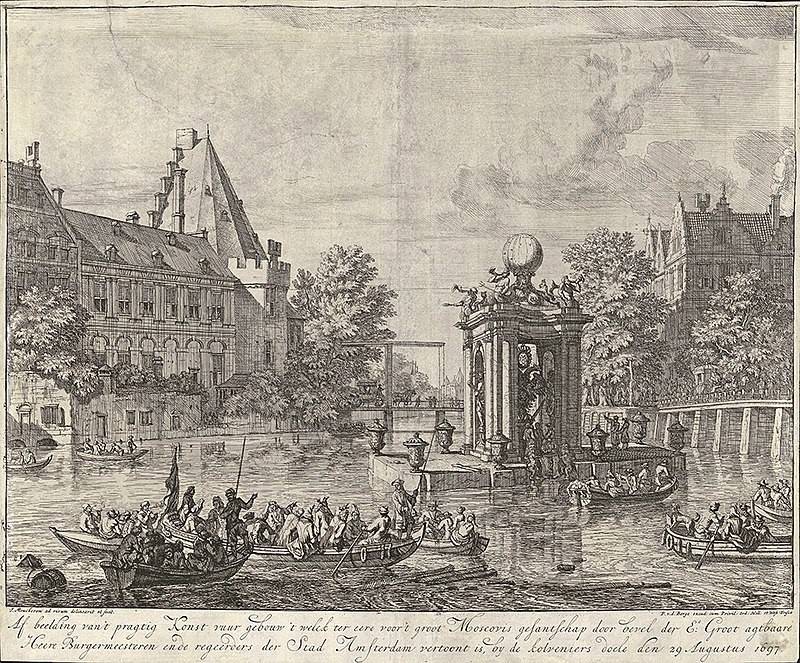
I. Moucheron, P. Berger "The Great Embassy in the Netherlands", ca. 1697
In Saardam, Piotr works at a shipyard disguised as an ordinary Dutch carpenter. But his demeanor made it clear to those around him that he was no ordinary carpenter. Yes, and Kista's wife let slip that the Russian Tsar himself lives in their house.
Crowds of onlookers begin to follow Peter on the streets, haunting him. Somehow a crowd of children stuck to him, begging for plums. He gave a drain to some children, but didn’t give it to others, for which they began to throw mud at Peter. After this incident, the burgomaster of Saardam ordered to place guards on the bridge, near Peter's dwelling. But that didn't help either. As soon as Peter was noticed on the street, crowds of curious people immediately ran. Therefore, already on August 15, having stayed in Saardam for only 8 days, Peter leaves for Amsterdam.
Saardam, now Zandam, is still proud of the fact that Peter once lived here. A monument was erected to the king on one of the squares of the city. Empress Elizabeth, daughter of Peter, bought all the furniture that served her father. Alexander I, having visited the Tsar's house in 1814, ordered to install a memorial plaque on it.

"Conversation of Peter I in Holland". Unknown Dutch artist. 1690s
So, Peter arrives in Amsterdam, where the embassy soon arrived. The king gets a job in the East India Company. And still building ships. For four whole months Peter stayed with the embassy in Amsterdam.
Peter especially liked the exemplary naval battle, which was given by the authorities of Amsterdam on the occasion of the visit of the Russian Tsar. Many sailing ships lined up in two battle lines. Peter, along with burgomasters and ambassadors, arrived on a richly decorated yacht of the East India Company. The fleet saluted the king with a salvo from all the guns, and then a mock battle began. Peter was so fascinated by this that he could not sit still and remain a spectator, he moved from the yacht to the warship and controlled it himself, as in a real battle.
Then all day long he worked for a shipbuilder at the shipyard. On September 9, Peter himself laid down the frigate.
Working at the shipyard, Peter tried not to impersonate anything, he worked, following all the orders of his master. And still, the news of who he was spread far beyond Amsterdam. Once, a noble Englishman specially came to Amsterdam to look at the famous carpenter. He asked the master where he could find the king. He pointed to a tall carpenter who was sitting on a log and resting. At this time, several workers were carrying a heavy log. The master shouted: “Peter, the carpenter of Saardam! Your comrades are having a hard time, so help them!” Peter immediately jumped up and put his shoulder under the log.
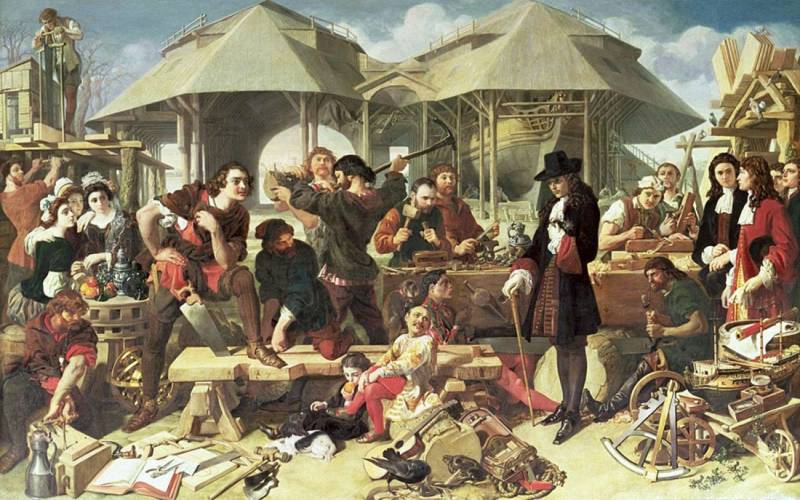
Peter I in Holland
Then the workers at the shipyard decades later told their children and grandchildren how they communicated with the king. Peter often talked with ordinary workers, told interesting stories, after work he drank beer with them in taverns.
But, despite the fact that he spent the whole day working at the shipyard, Peter still managed to be aware of the affairs of Russia, Turkey and Poland. In letters, he wrote orders to the boyars in Moscow, answered their letters. He was forced to do this at night, giving sleep for three to four hours.
Peter was very inquisitive. He constantly asked knowledgeable people everything that he did not understand. The king even hired a teacher who taught him the theory of shipbuilding. But soon even he admitted to Peter that he did not understand everything in ship drawings, explaining that the Dutch mostly built out of habit, by eye, without drawings.
Peter was interested in Holland not only in shipbuilding, but also visited hospitals, educational homes, factories, factories, which were not in Russia at that time. And always the young king had a hand in everything, he wanted to try everything himself. He learned how to make paper, engravings, and also became interested in anatomy.
Peter also met many of the then famous scientists in Holland. Often the king visited the anatomy professor Ruysch. This professor had his own anatomical theater, similar to modern theaters, but in the middle of it there was a table on which corpses were processed. Once Ruysch dissected the corpse of a baby, who after that smiled as if in a dream. The king, who visited the professor, did not believe that the child was dead, then Ruysch opened the glass lid. And only by touching Peter was convinced that there was a corpse in front of him.
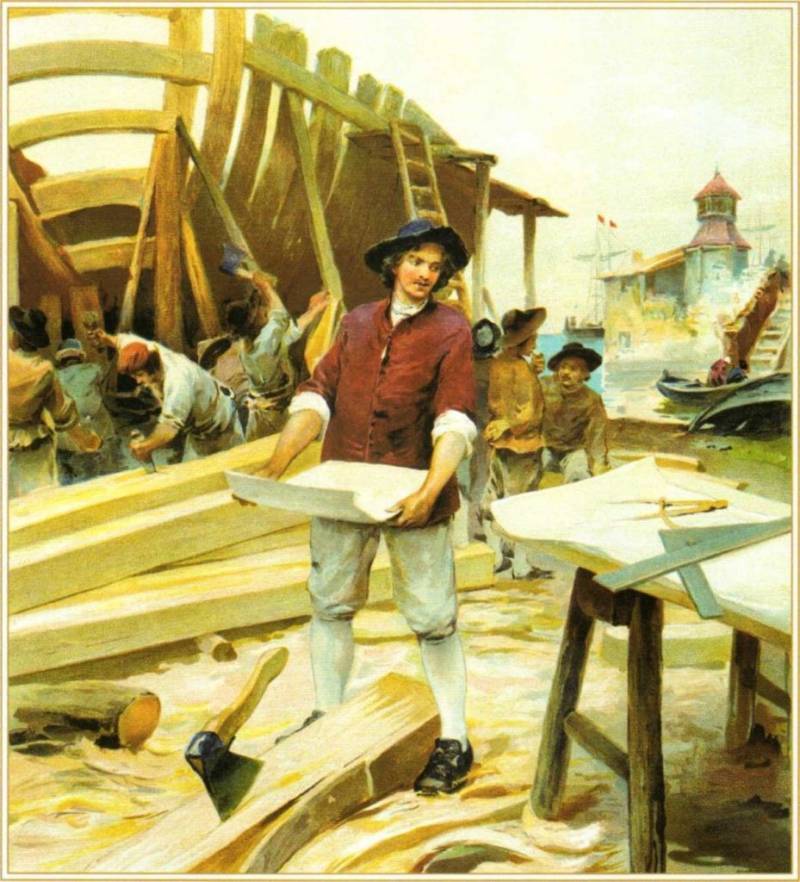
Peter I works at a shipyard in Holland
Subsequently, Ruysch became a true friend of the king. Peter attended the lectures of the professor, constantly asked him about everything that he did not understand, they visited hospitals together, where Ruysch treated the sick.
In Leiden, Peter met the professor of medicine Burgav and also examined his anatomical study. He stared at the embalmed corpse for a long time. Seeing that the members of the retinue accompanying him contemptuously frown and turn away, Peter forced them to tear the muscles of the corpse with their teeth.
In Utrecht, Peter met the English king and Dutch stadtholder William III, who received the king hospitably and presented him with a yacht.
The tsar also recruited officers for the Russian service. Among the officers who then entered the service was the future Admiral Cornelius Kruys, who a few years later would command the Baltic fleet. The question may arise why the Dutch officers so easily agreed to transfer to the Russian service? The fact is that they knew well that even a simple sailor could become an admiral there, a teacher an academician, and a soldier a field marshal. And the example of Kruys is just one of many. In addition to this, foreigners were well paid.
However, another task of the embassy - to persuade Holland to go to war with Turkey - was not successful. Not a single European country then wanted to fight with the strong and huge Ottoman Empire, whose possessions were on three continents, from the Balkans to Baghdad, Egypt and the Arabian Peninsula.
They did not want to fight the Turks for another reason - everyone expected the death of the sick Spanish king Charles II, who had no heirs. The possessions of Spain were then in North, South America, Asia, Africa and occupied a much larger territory than the possessions of Turkey. A new war was brewing for the Spanish inheritance, which England, Holland and the Austrian Habsburgs, relatives of the Spanish king, were ready to share. Everyone expected his death, but Charles II would die only two years later.
But at the same time, Peter realized that countries such as Prussia, Saxony and the Commonwealth would not mind fighting with another powerful country - with Sweden, where King Charles XI had recently died, and the throne passed to his fifteen-year-old son Charles XII.
Once Peter visited the house of the merchant Jan Tessing. At dinner, the king expressed the idea that the knowledge of shipbuilding acquired at the shipyard did not satisfy him. An Englishman was sitting at the table, who declared that in England shipbuilding had reached the highest degree of perfection, and that its theoretical course could be completed in a short time.
To be continued ...
- Andrey Sarmatov
- https://ru.wikipedia.org https://annapeicheva.ru
Information